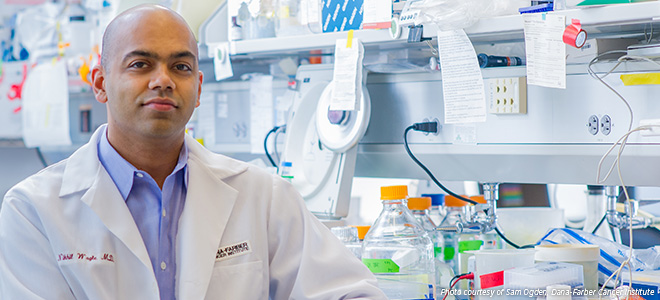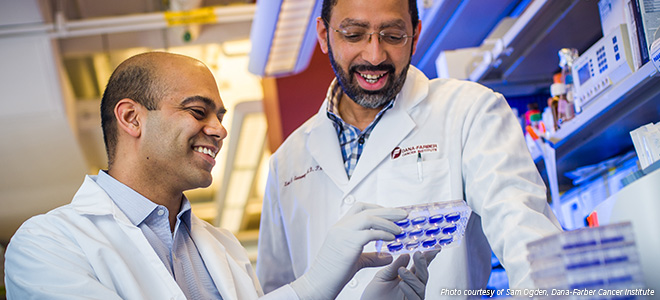Dr. Nikhil Wagle: Advancing Personalized Cancer Medicine
Dr. Nikhil Wagle, an early-career physician-scientist at the Dana-Farber Cancer Institute, is working to translate the revolution in cancer genomics into advances in personalized cancer medicine in the clinic.
If you or someone you care about has been diagnosed with cancer, you may have heard the term personalized medicine. But what is personalized medicine and how could it affect your cancer treatment?
Personalized cancer medicine – it’s sometimes called precision medicine – refers to the tailoring of treatments to the individual characteristics of patients and their specific cancers. Currently, a limited number of personalized cancer medicines are used, mostly to treat blood cancers and melanoma as well as some forms of lung and breast cancer.
Nikhil Wagle, MD, an instructor in medicine at the Dana-Farber Cancer Institute in Boston and associate member of the Broad Institute in Cambridge, Mass., is working to vastly expand use of personalized cancer medicine and deliver on its promise for many more people.
His research focuses on using cutting-edge genomic technology, which allows him to ‘read’ all of the units of the genome, to achieve this goal for patients with a wide range of cancer types, in particular solid tumors such as bladder, breast, and lung cancer.

Guiding Clinical Decision Making
Dr. Wagle is using this approach because changes, or mutations, in the genetic material of a cell can disrupt molecular pathways that control cell function and lead to cancer. Personalized cancer medicines are designed to target the cancer-specific molecular-pathway disruptions that arise from those genetic mutations.
As a result, intensive analysis of the genetic material, or genome, of an individual patient’s tumor could guide clinical decision making.
“The ultimate goal is for every cancer patient to get genomic analysis of their tumor, understand the molecular underpinnings of their particular tumor, be able to predict the optimal therapies, and also be able to predict and pre-empt resistance to these therapies,” says Dr. Wagle.
He provides a glimpse of this future in the AACR Cancer Progress Report 2014, when he describes how in-depth sequencing of the tumor from a patient with advanced lung cancer uncovered genetic mutations that had not been detected by standard testing. The identification of these mutations led to the patient’s receiving treatments, in clinical trials, that otherwise would not have been considered or available. And as a result of these treatments, the patient continues to do well.

Matching Patients With the Optimal Therapy
Detailed genomic analyses are also being conducted by Dr. Wagle and his colleagues to try to understand why some cancer patients benefit much more from a certain treatment than other patients. The idea is that the information he gleans from these patients – often called exceptional responders – can help identify other patients who will likely benefit from the treatment.
One exceptional responder study undertaken by the team was reported recently in Cancer Discovery, a journal of the American Association for Cancer Research. The researchers identified two genetic mutations likely responsible for a bladder cancer patient’s dramatically prolonged response to a drug combination being tested in a phase I clinical trial.
“Patients with tumors that harbor these alterations might be particularly suitable for treatment with drugs like everolimus and other mTOR inhibitors,” says Dr. Wagle. “This study is yet another example of how therapies targeted toward the genetic features of a tumor can be highly effective.”
The goal moving forward is to identify as many of these genetic features as possible and have an array of drugs that target each of them, Dr. Wagle explains. That way, specific drugs will be available that can be matched to individual patients based on the genetic make-up of their cancers.
Understanding Why Patients Develop Drug Resistance
Dr. Wagle is also using genomic technology to identify new potential ways to help patients with breast cancer. He earned a $100,000 Landon Foundation-AACR INNOVATOR Award for Research in Personalized Medicine for his project “Systematic Genomic Profiling of Endocrine-Resistant Breast Cancer.”
Hormone therapies benefit many patients diagnosed with breast cancer. For a substantial number of patients, however, the drugs eventually stop working and their tumors start growing again. In this situation, the tumor is said to have become resistant to the treatment. With his AACR grant, Dr. Wagle is looking for genetic mutations responsible for these cancers becoming resistant to hormone therapies, with the goal of directing patients to clinical trials that target the effects of their specific mutations.
Ultimately, Dr. Wagle hopes genomic analysis will become part of the initial standard-of-care approach to treating patients with cancer.
He anticipates a future where “in addition to the normal radiology studies and pathology studies, we do a genomic analysis” of every person diagnosed with cancer in order to “understand the genomic dependencies in that tumor.”
Clinicians, patients, and families will then be able to “use that information along with all of the other clinical and pathological information to make the most informed decision right up front.”




